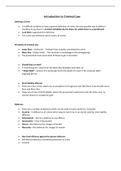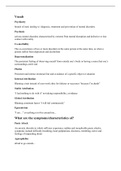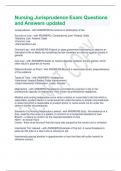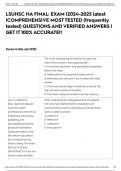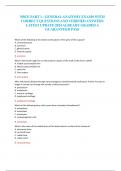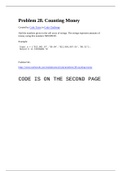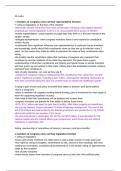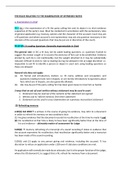Introduction to Criminal Law
Defining a Crime
• It is difficult to define to have a general definition of crime, the only possible way to define it
would be to say that it is Conduct forbidden by the State, for which there is a punishment
• Lord Atkin supported this definition
• This is the only definition which covers all crimes
Principles of Criminal Law
• Actus Reus - 'Guilty Act' - Finding if they actually committed the crime
• Mens Rea - 'Guilty minds' - The intention or knowledge of the wrongdoings
• The prosecution must prove both of these to get a conviction
• Should they co-exist?
• A 'Continuing Act' means that the Mens Rea develops much later on
• *Thabo Meli* - Actions of D eventually led to the death of V even if the initial act didn't
originally kill him
• Strict liability offences
• There are some crimes which are an exception to the general rule that there must be both Actus
Reus and Mens Rea
• These are crimes of strict liability, where the prosecution need prove only the actus reus; no
mental element is needed for guilt
Defences
• There are a number of defences which can be used to lead a verdict to 'not guilty'
• Insanity – A defence to all crimes which require mens rea; it can not be used for strict liability
offences
• Automatism – Can be a defence to any offence
• Intoxication – Only if intoxicated
• Duress –Not defences for charges of murder
• Necessity – Not defences for charges of murder
• Non fatal offences against the person defences
• Self defence/defence of another/prevention of crime
• Consent
, Actus Reus
What is actus reus?
• It is the physical element of the crime – An act – A failure to act – a 'state of affairs
• Voluntary nature of actus reus
• Act or omission must be voluntary on the part of the defendant
• If the Defendant has no control over his actions then he has not committed the actus reus
• *Hill v Baxter 1958* - Court gave examples of where a driver of a vehicle could not be said to
be doing the act of driving voluntarily – E.g loss of control due to a swarm of bees, a heart
attack
• An involuntary act could be if the person hits another person because of reflex or if one person
pushes a second person, causing them to bump into a third *Mitchell 1983* - Pushed an old
man, and that man fell into an old woman, who then died of her injuries
• State of affairs cases
• There are some rare instances in which the defendant has been convicted even though they did
not act voluntarily
• *Larsonneur 1933* - D ordered to leave UK, D went to Ireland, Irish deported her back, when
back in the UK she was a arrested, it did not matter that she had been brought back against
her will
Omission – Failure to act
• The normal rule is that there is no liability in the omissions – If you fail to do things it generally
does not lead to liability, although there are some exceptions
• There are a number of duties that exists which can make you liable
Duty Explanation
Statutory duty If it states In the Act you must do something and
you fail to do it, you can be liable
E.g Road trafic act – Failing to provide a specimen
of breath
Contractual duty *Case of Pittwood* - A man was a gate keeper,
his only job was to ensure that when a train was
coming he had to shut the gate, but he failed to
do that and people were killed
*Case of Holloway* Electrician who owed a duty
of care to his employers, left some wires out in
, the open which led to the electrocution of a
family member
Duty by relationship I.e A parent and child – Parents owe a duty of
care to the child to feed it etc..
*Case of Gibbons and Procter* - Father and
partner deliberately starved to death there own
7 year old daughter and were convicted of
murder
Omission can lead to a conviction of murder
Voluntary duty Voluntarily caring or looking after somebody
*Stone and Dobinson* - The infirmed sister of a
man was being looked after by him and his
partner, but they left her to die, however they
were partly disabled, so it was argued there
should not be a prosecution, but the court said
they volunteered to look after her, therefore
they had a duty of care and they convicted of
gross negligence manslaughter
Duty through official position *Case of Dytham* - Police officer saw a bouncer
beating a man to death, he walked away to his
car and drove off and the victim was then killed
– Court said that he owed a official public duty
to people
Duty which was started by D (Supervening fault) *Case of Miller* - A man lit a cigarette and
dropped it on the mattress, he then left the
room and left the fire to carry on, he was then
convicted of Arson as he had a duty to put out
what he had started which he failed to do
• Comment - 'Good Samaritan law'
• Some countries have a law which is known as the good Samaritan law – It makes people
responsible for helping other people in 'emergency situations'
• However there are problems in enforcing such a law –
• What if a 'rogue' pretends to be seriously hurt in order to lure a stranger?
• There's a risk of a untrained person, by intervening could do more harm to an injured person
• Who decides what a 'emergency situation' is?
• What is several people witnessed the incident?
• Would the rescuers have to put there life at risk?
• Professor Glanville – He believes in the approach of keeping the same laws on liability for
omissions – It is believed that you should not be liable for failing to do something that has
nothing to do with you, as it can cause harm to maybe both people, or there is the issue of if
there are many witnesses are they all liable
, • Professor Ashworth – He has the belief that the UK should reform the laws on omission and
have a law similar to the 'good Samaritan' law that they have in France, where you can be liable
for omission because it is said there are too many crimes being ignored, such as if you see the ill
treatment of a child or if you ignore the screams of someone
• Involuntary manslaughter and omissions
• Involuntary manslaughter can be committed in different ways, there are two main ones –
Unlawful act manslaughter - Gross negligence manslaughter
• Unlawful act manslaughter cannot be committed by an omission – This was decided in *Lowe
1973* - D was a father of an 9 week old baby, he told mother to take the child to hospital, but
did nothing more, the mother did not take the baby to the hospital and the baby died – D was
convicted of manslaughter, CoA quashed the conviction because there was no 'unlawful' act –
Failure to do something could not be an act
• However, gross negligence manslaughter can be committed by an omission
• For gross negligence manslaughter the defendant must owe the victim a duty of care
• The duty of doctors
• There can be cases where doctors decide to stop treating a patient if the discontinuation of
treatment is in the best interests of the patient then it is not an omission which can form the
actus reus – This was decided in *Airedale NHS Trust V Bland 1933* - Bland was a man who
had been crushed at the Hillsborough football stadium disaster, he was left in a persistent
vegatative state, unable to do anything and unaware of his surroundings, fed artificially,
Doctors asked to stop feeding him even though he would die as a result, this was held to be in
his best interests
• Comment on the law of omissions
• Actus reus is not an accurate description of conduct which can be sufficient to make a person
liable for an offence
• Actus reus means an act: yet the law clearly recognises that a failure to act can be sufficient
liability
• Other several issues include...
• Should there be wider liability for omissions such as the Good Samaritan law
• The problems of deciding when a duty should be imposed so that an omission is sufficient for
the actus reus of an offence
• Should a person be liable for failure to act when they assume a duty
• Omissions in medical treatment
• The justification for statutory imposition of liability for an omission
Continuation next page...
,Standard and burden of proof
• In criminal cases the standard of proof is 'Beyond a Reasonable doubt'
• This is a higher standard than in civil cases which is 'On the balance of probabilities
• Presumption of innocence
• An accused person is presumed innocent until proven guilty
• It is the job of the prosecution to prove the D guilty by proving the actus reus and mens rea
• *Woolmington v DPP 1935*
• This case established several important points....
• The prosecution must prove the case
• This rule applies to all criminal cases
• The rule must be applied in any court where there is a criminal trial
• Guilt must be proved beyond a reasonable doubt
• A reasonable doubt can be raised by evidence from either the prosecution or the defence
SELF TEST QUESTIONS
• Give an accepted general definition of crime
• Give an example of how law can change over a period of time
• Which state agency prosecutes in the majority of criminal cases?
• What are the two elements which must be proved in most offences?
• Name three general defences
• Which defences are particularly relevant to non-fatal offences against the person?
• What is the standard of proof requires in criminal cases?
• Who normally has to prove the case?
,Problems of deciding when a duty exists
• It is not certain when a duty to act will exist
• The normal way of deciding this is...
1. By the judge at the trial determining whether there is evidence capable of establishing a duty in
law
2. The jury then deciding whether the duty does actually exist
3. Finally the jury have to decide if the duty has been broken
• This means that the law is capable of expanding to cover more situations – This is established in
*Khan v Khan* - D's supplied heroin to a new user who took it in their presence and collapsed,
left her alone and when returned to the flat, she was dead, conviction for unlawful
manslaughter quashed, but CoA thought there could be a duty to summon medical assistance
in certain circumstances, so a D could be liable for failing to do so
• However it can be argued that having it cover more situations makes the law too uncertain – In
what new situations will it be decided that a failure to act can sufficient for the mens rea of an
offence?
Assuming a duty
• It can be seen as harsh to someone who accepts an adult into there home and has to have an
assumed duty to that person
• An adult is normally held responsible for their own life, however if that adult is vulnerable then
the argument for imposing a duty is that the person assuming the duty is in the best position to
ensure that harm is avoided – He or She will know the vulnerability of the victim when others do
not
• This is the reason for placing such a person under a duty to act and making them liable for a
failure to do anything
• There is also the question on what D needs to do to discharge or fulfill their duty – Usually this
duty can be completed with the request of help – It is not necessary to do more than that
Medical treatment
• One area of law which seem contradictory is the duty of doctors
• If doctors decide it is the best interests of the patient to withdraw treatment I.e life support,
then doctors cannot be held liable for in respects of the patients death
• This was the effect of the judgement in *Aire NHS Trust v Bland*
• The issue is whether taking of life support or stopping treatment is in the best interests of the
patient
• In Bland the HoL emphasized that euthanasia by a positive act terminating the patients life
would remain unlawful
Statutory duties
, • Statutes impose duties in a wide variety of situations and make it an offence to fail to do these
duties
• Many of these are connected with vehicles/and or driving
• Laws in this area often impose strict liability – This means that not only is the defendant liable
because he has failed to do something, but in addition the prosecution does not have to prove
there is any mens rea – The justification is the greater good of society
• Some statutory duties have been imposed because of the difficulty of proving an offence - This
was the reason for the introduction of the offence of causing or allowing the death of a child or
vulnerable adult under the Domestic Violence, Crime and Victim's act 2004 – Before it would be
hard to find who was to blame as they would blame each other about who caused the death of
a child, but now all members of the household are liable for failure to protect the child
• The law may have the effect of persuading other family members to report the abuse
Self test questions
• Give an example of non-voluntary conduct which would not constitute the actus reus of an
offence
• What is meant by a state of affairs offence?
• What is the normal rule about whether an omission can constitute the actus reus of an
offence?
• What is meant by a 'Good Samaritan' law? Give 3 problems that could arise from having such
a law
• Name 2 offences created by an Act of Parliament (statutory law) where failure to act is the
actus reus of the offence
• Explain, using a case example, when an omission can be sufficient for the actus reus where D
is under a duty of care because he has set in motion a chain of events
• Explain, using a case example, when a omission can be sufficient for the actus reus where D
has voluntarily undertaken a duty of care
• In what three other duty situations may an omission be sufficient for the actus reus?
• What type of manslaughter cannot be committed by an omission?
• Give one justification for liability for omissions and one argument against liability for
omissions
Causation
• This establishes whether the D is liable for the death on injury to the victim
• If an intervening act (Novus actus interveniens) is present the chain of causation may be broken
and D could escape liability for the death or injury, however, in the vast majority of cases the
chain will remain unbroken
• The court used two tests to determine whether the chain has been broken and who is
responsible for the death
,Factual cause of death
• This is also known as the 'but for' test I.e but for D's act would the victim have died? - An
example of this can be seen in the case of *White* - when a man put poison in his mother's
coffee, but she died independently of a heart attack – Factually, he did not cause the death, so
the test failed, and he was convicted of attempted murder instead - *Pagett 1983* - D took his
pregnant girlfriend from her home by force, held her hostage, police told him to surrender, D
came out holding the girl and fired at the police, police returned fire, and the girl was killed by
bullets, D was convicted of manslaughter – V would not have died 'but for' D's actions
The legal cause of death – The courts apply 2 situations to determine whether D is responsible in law
a. Firstly, the act of D must be significant or substantial cause of the death or more than a
minimal cause of death...
• In the case of *Kimsey 1996* - the court suggested that D would be responsible if there actions
were ''more than a slight or trifling link'
• The conduct must be more than 'De minimis'
b. It needs to be established whether an intervening act has broke the chain...
• D may argue a number of situations which potentially could break the chain of causation
i. D may argue that others are to blame - this occurred in the old case of *Benge* - when a
railway foreman was responsible for laying a track and protecting his workers by providing
adequate lighting and safety procedures, however a train was travelling fast and killed several
workers, but D argued that the driver was to blame but the foreman was still held liable for
the deaths
ii. D may argue the victims own act broke the chain – sometimes the victim may react
disproportionately to the threat and break the chain as in the case of *Williams*- when the
victim jumped out of a fast moving car and was so daft he broke the chain – Conversely, in
*Roberts*- a female Hitchhiker jumped out of a car to avoid sexual advances but D was still
held liable- Similarly in *Lewis* - D was responsible when the victim jumped out of a window
after fearing a vicious attack – V's actions can hold D liable if the actions were reasonably
foreseeable - as seen in the case of *Marjoram 2000* - D shouted abuse at V and kicked V's
hostel room door over, V then fell/possibly jumped from the window and suffered serious
injuries – D's conviction for GBH was upheld by CoA – Reasonably foreseeable that V would
fear them and try to get away
iii. D may argue that a pre-existing condition breaks the chain of causation – If V has a medical
condition such as hemophilia or a weak heart then D may try to argue that a 'normal' person
would not have died – In the case of *Haywood* - D had an argument with his wife and
chased after her into a street where she collapsed and died of a week heart that he was
unware or, despite this, he was still liable because you must 'take your victim as you find
them' this is sometimes referred to as the thin skull rule or the Eggshell skull rule
iv. D may argue that the refusal of medical treatment breaks the chain - the courts adopt a
similar principle as for pre existing medical conditions I.e you should take your victim as you find
, them, this includes mind as well as body I.e if the victim has certain beliefs such as a Jehovah's
witness as in *Blaue* and denies treatment, then this does not break the chain – Similarly in the
case of *Holland*- a man refused to have his finger amputated despite the risk of blood
poisoning from which he later died, the chain was not broken by his actions – Finally in the
case of *Dear* - the victim actually opened up his wounds and subsequently died, surprisingly,
despite his actions the court still convicted D but this decision is controversial in many
respects
v. D may argue that medical negligence broke the chain – Medical treatment is unlikely to break
the chain of causation unless it is so independent of the act that 'in itself so potent in causing
the death' that the defendants acts are insignificant – Cases related to this are *Smith 1939* -
*Cheshire 1991* - * Jordan 1956* - The chain of causation is not broken if the patient is taken
off life support as stated in *Malcherek 1981*
Key Cases
Case Facts Law
Smith 1959 Soldier stabbed another D liable if the injuries he
soldier, V's medical treatment caused are still an operating
very poor and affected chances and substantial cause
of recovery
Cheshire 1991 D shot V, V needed a Medical treatment would only
tracheotomy, V died because of break the chain of causation if
complications from the it is 'so independent' of D's acts
tracheotomy, his wounds were and 'in itself so potent in
virtually healed causing death'
Jordan 1956 V was stabbed, when his The chain of causation was
wounds were almost healed he broken in this case as the
was given a large dose of a medical treatment was so
drug, which it was known he 'palpably wrong'
was allergic to
Malcherek 1981 D stabbed wife, she was put on Switching off a life support
life support but when tests machine does not break the
showed she was brain dead, chain of causation
the machine switched off
Flowchart - Rules on causation
• Was D's conduct the factual cause of the consequence ('But for' test) -----> No = Not guilty
Yes
• Was D's conduct more than a minimal cause of the consequence? -----> No = Not guilty
Yes

